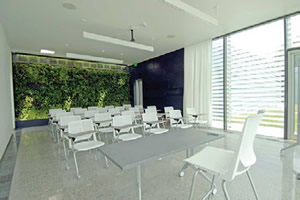A Showcase of Sustainability

Johnson County Community College created a showcase of sustainability on their campus with help from Mitsubishi Electric’s VRF technology.
Johnson County Community College (JCCC) in Overland Park, KS, serves about 20,000 students. In 2009, the school formed the Center for Sustainability to commit to an environmentally and socially responsible campus. This commitment meant changes were needed for every building project, including a new 3,000-square-foot Galileo’s Pavilion. Mitsubishi Electric Cooling & Heating’s Variable Refrigerant Flow (VRF) technology, along with efficient practices, helped make Galileo’s Pavilion a true showcase of sustainability.
Not-for-profit corporation Studio 804, comprised of University of Kansas graduate students, was selected to work on Galileo’s Pavilion. These students design and construct technologically sophisticated, green buildings under the direction of Dan Rockhill.
Rockhill says, “We had three distinctly separate spaces. Although they’re in the same building, the loading on them is different. So that resulted in three separate air-conditioning and heating solutions. We pride ourselves on promoting sustainable everything, so HVAC is no exception.” VRF was the clear choice to meet these challenges.
Rockhill continues, “Mitsubishi [Electric] is, first of all, the leader in its field. That’s the most important thing. Many of the others follow, but Mitsubishi [Electric] developed the variable refrigerant concept. They know what they’re doing.”
Installation went smoothly and the staff is pleased with how well the systems operate. JCCC’s Sustainability Project Manager Michael Rea says, “Everything with the Mitsubishi [Electric] system has been going well. No compressor failures, no leaks, no fan problems, nothing. Our maintenance is easy, too—just changing the filters and making sure the condensers are clean.”
Plus, another sign of success: LEED Platinum certification was achieved for the changes that were made to Galileo’s Pavilion. The school was also honored to receive the 2013 CSI Kansas City Chapter Innovation in Sustainability Award for the building.
www.mitsubishielectric.com
This article originally appeared in the College Planning & Management July/August 2018 issue of Spaces4Learning.